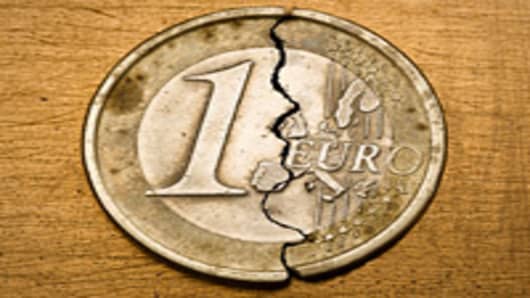Greece has “one last chance” to prove its credibility to international lenders, Eurogroup chief Jean-Claude Juncker told a press conference in Athens. But with the country set to ask for yet another extension on its bailout, some economists are questioning whether it’s time to expel Greece from the euro zone – or whether, perhaps, it will choose to leave of its own accord.
“I actually think that Greece ultimately makes the choice when it comes down to it,” Michala Marcussen, Global Head of Economics at Societe Generale told CNBC Thursday. “The real issue…is the will of the political process to implement structural reform, to move ahead on the privatization [program].”
Greek Prime Minister Antonis Samaras is set to ask for a two-year extension of the bailout terms agreed to earlier this year when he meets German Chancellor Angela Merkel and French President Francois Hollande.
Juncker said that whether Greece would be granted more time would depend on a report from troika (European Central Bank (ECB) , IMF and European Commission) debt inspectors in September. Despite his warning, the head of the Eurogroup, told reporters, he still has faith in Greece. In response, Samaras has promised that Greece “will change.”
“What irritates the euro zone leadership is that Greece is not getting to grips quickly enough with the governance structure that it has in the public sector and not implementing structural reforms,” Marcussen said. “When we hear that Greece has ‘a last chance’ I think it means there’s a last chance for the political process to do necessary measures.”
Economist John Velis, Head of Capital Markets Research, EMEA at Russell Investments agreed that unlike Spain, Portugal and Ireland, Greece had “dragged its feet whether it be over reforms, structural reform or even just over having decisive elections.”
“Why not let it go? It shreds the whole idea of an irrevocable currency union…and six months ago there was the idea of ‘We can let Greece go, it’s tiny, it’s only worth about 3 percent of GDP’ but the contagion effects are both political and economic.”
As with every disruptive child there are parents who must share the blame, and questions remain over whether Greece should have been allowed to enter the euro zone in the first place with its weaker economy, unstructured yet burgeoning public sector and questionable book keeping.
Greece was both a fledgling democracy and economy when it joined the European Union in 1981. Marcussen said it was easy to forget Greece’s motivations for being a part of Europe.
“Greece joined the European Union to stabilize a very young democracy. We forget that now…Portugal and Spain had much stronger governance structures when they joined — Greece still needs to makes reforms [in this area],” she said.
Marcussen concluded that whether Greece stayed within or without the euro family, it had to change — but the ultimate possibility of Greece leaving would result in a country “with huge instability on the fringes of Europe.”
“Whether Greece stays in or stays out,” she concluded, “It will be costly for Europe.”




